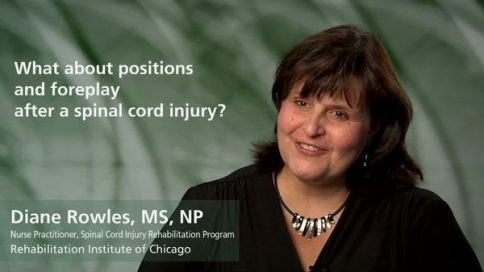How should people deal with spasticity during sex? - Diane M. Rowles, MS, NP
|
|
How should people deal with spasticity during sex? |
|
Diane M. Rowles, MS, NPNurse Practitioner, Spinal Cord Injury Rehabilitation Program, Rehabilitation Institute of Chicago |
||
| Read Bio | More Videos by Diane M. Rowles | |
|
Share |
||
Transcript
So, let’s talk about spasticity a little bit. As far as positioning, spasticity can help with position, or it can hinder with position. If the spasticity is so bad that you can’t get into position, your partner can’t get near you, then obviously you want to make sure that you’re having intercourse when your anti-spasticity medications are working the best. The thing to remember is, if you’re counting, if you’re a male, counting on a reflex erection, and you’re taking your anti-spasticity medications, the anti-spasticity medications are likely going to give you less of an erection. That’s when we add in some of the other things to help with erections, whether it’s the oral medications, or the pump, or the injections or whatever. If you count on a good reflex erection, spasms aren’t so bad, then I really recommend people have intercourse when their anti-spasticity medication is wearing off, so that their reflexes are the strongest to help with the erection. For women and spasms, again it’s the adduction spasms usually that are the problem. If a person doesn’t have real severe spasms, spasms can be helpful in positioning, can be helpful in movement, it can be helpful in stimulating the partner, because there’s a better squeeze. So spasms can be helpful, or they can be a hindrance.
Show Less|
|
||
add
How should people deal with spasticity during sex? |
||
Diane M. Rowles, MS, NPNurse Practitioner, Spinal Cord Injury Rehabilitation Program, Rehabilitation Institute of Chicago |
More Videos by Diane M. Rowles | |
| Transcriptadd | share | |
So, let’s talk about spasticity a little bit. As far as positioning, spasticity can help with position, or it can hinder with position. If the spasticity is so bad that you can’t get into position, your partner can’t get near you, then obviously you want to make sure that you’re having intercourse when your anti-spasticity medications are working the best. The thing to remember is, if you’re counting, if you’re a male, counting on a reflex erection, and you’re taking your anti-spasticity medications, the anti-spasticity medications are likely going to give you less of an erection. That’s when we add in some of the other things to help with erections, whether it’s the oral medications, or the pump, or the injections or whatever. If you count on a good reflex erection, spasms aren’t so bad, then I really recommend people have intercourse when their anti-spasticity medication is wearing off, so that their reflexes are the strongest to help with the erection. For women and spasms, again it’s the adduction spasms usually that are the problem. If a person doesn’t have real severe spasms, spasms can be helpful in positioning, can be helpful in movement, it can be helpful in stimulating the partner, because there’s a better squeeze. So spasms can be helpful, or they can be a hindrance.































